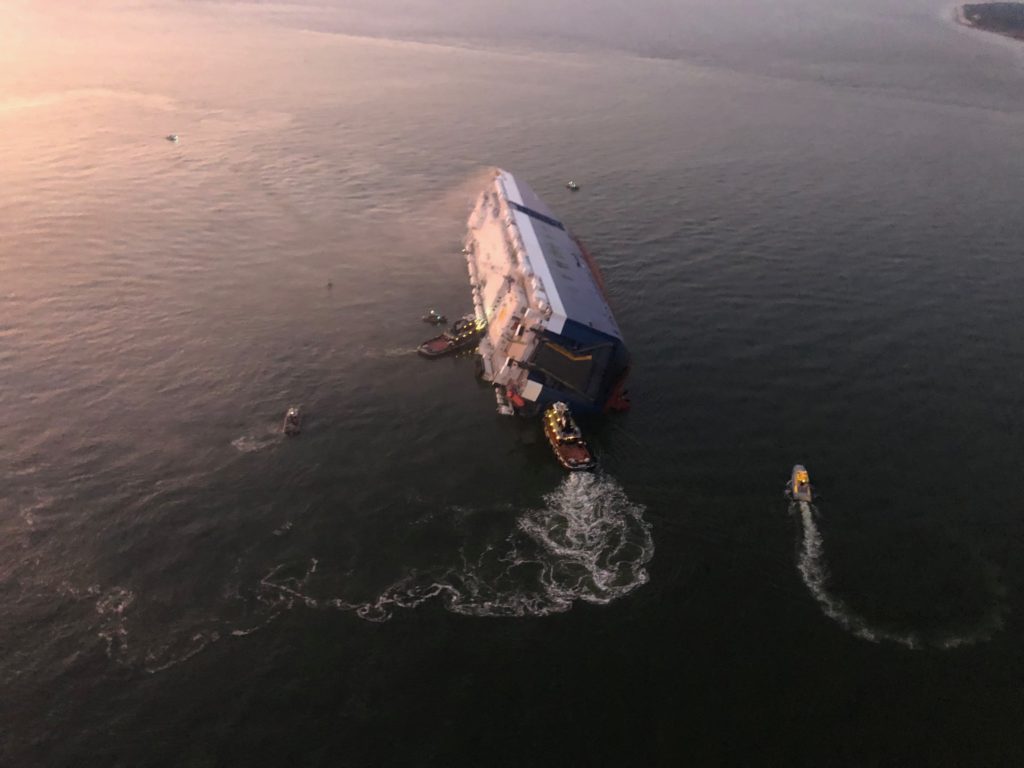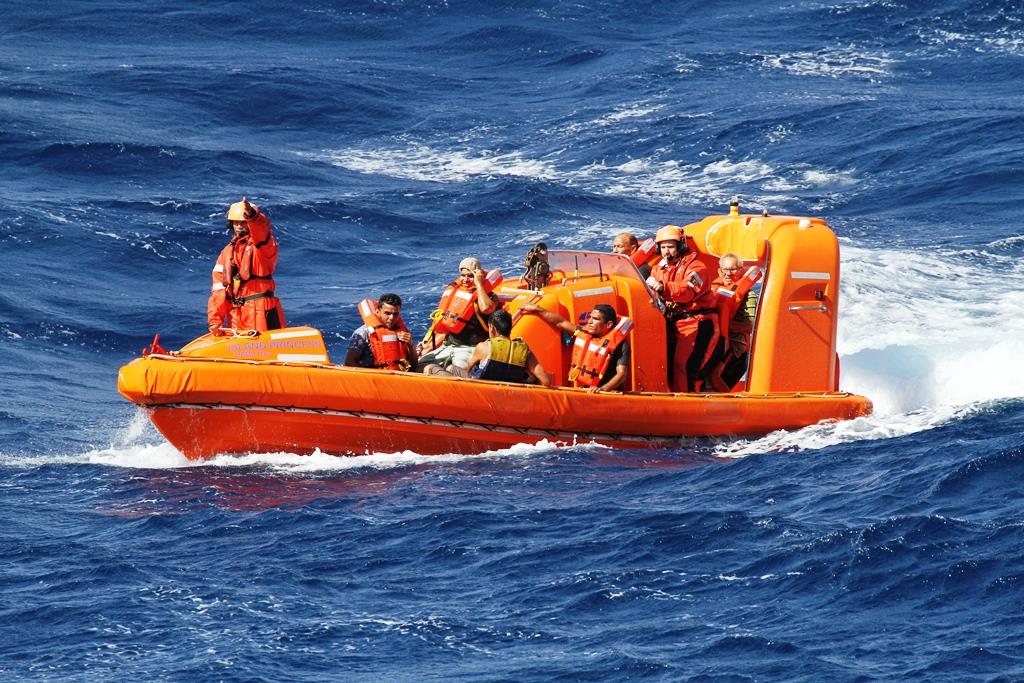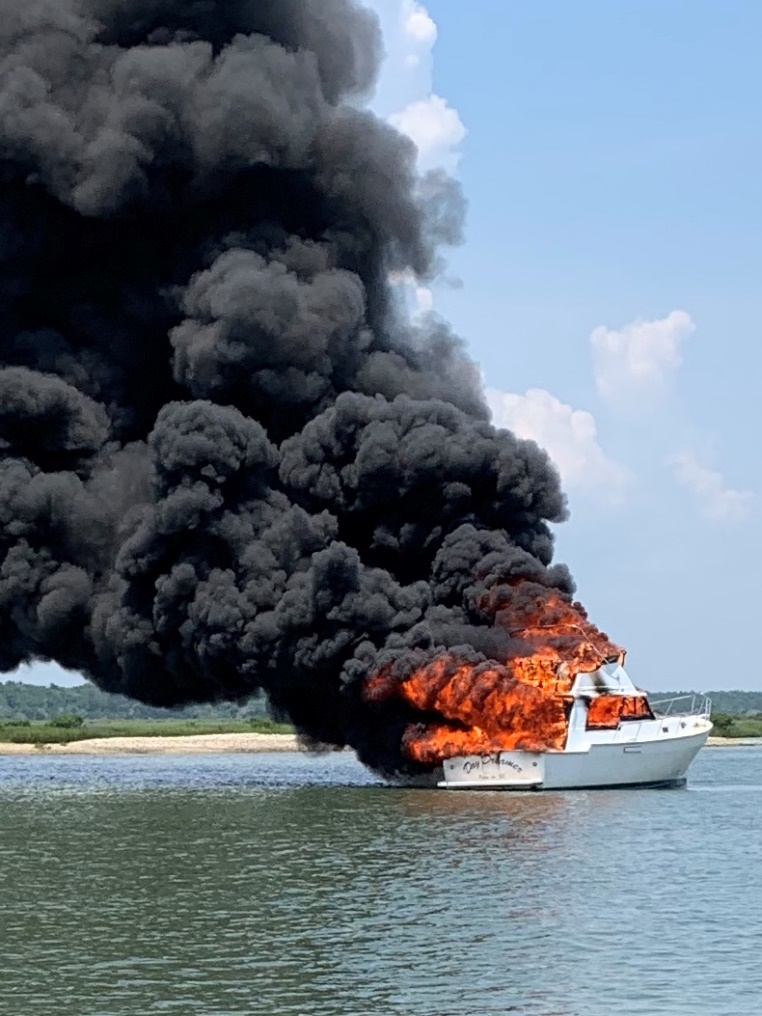
Four individuals and the captains and crews of a commercial ship and a cruise ship have been selected for maritime search and rescue awards for their selfless and heroic actions, part of an annual awards program of the Association for Rescue at Sea (AFRAS).
The awards are for at-sea rescues that occurred during 2019, and comprise more than a dozen souls saved – from St. Simons Sound, Ga., to the waters of the North Atlantic and Caribbean to the Intracoastal Waterway (ICW) in Florida. Two active duty U.S. Coast Guard helicopter rescue swimmers, two Florida-based U.S. Coast Guard Auxiliary members and the captains and crews of a bulk carrier and a cruise ship are the AFRAS awardees this year.
AMVER AWARD
The captain and crew of the motor vessel Virtuous Striker, a Bahamian-flagged bulk carrier owned by Safbulk Maritime SA, rescued a lone sailor from his disabled catamaran in heavy weather 330 miles south of Nantucket, July 24, 2019.
The U.S. Coast Guard-staffed Rescue Coordination Center (RCC) in Boston was alerted to trouble aboard the 37-foot catamaran Ishmael after receiving an Emergency Position Indicating Radio Beacon (EPIRB) alert. Virtuous Striker was contacted after using an Amver Surface Picture and requested to divert. The Surface Picture locates participating vessels in an area of distress.
The Virtuous Striker’s captain reported winds of more than 50 knots and seas exceeding 10 feet, but agreed to divert.
“It will take us approximately 14 hours to arrive on scene, but we are diverting to assist,” the captain reported to the RCC after the request. Meanwhile, the Coast Guard had launched a rescue aircraft, and the crew was able to locate the Ishmael and drop a radio and survival supplies. Radio communications were difficult because of the severe weather.
Virtuous Striker located the distressed sailor and recovered him safely in slightly improved conditions – 25-knot winds and 8-10 foot seas. Captain Vitaliy Skidanov reported to the Coast Guard, “We have safely rescued the sailor. He will remain with us until we arrive at our next port call in Mississippi.”
Amver, or the Automated Mutual Assistance Vessel Rescue System, sponsored by the United States Coast Guard, is a computer-based voluntary global ship reporting system used worldwide by search and rescue authorities to arrange for assistance to persons in distress at sea.
A Swedish sailor is rescued from his disabled sailboat by the crew of the motor vessel Front Leopard. U.S. Coast Guard video.
Voting for this year’s Amver Award was close, and the AFRAS Officers and Board of Directors agreed the achievements of the captains and crews of the motor vessels Cap Papatele and Front Leopard were noteworthy.
The captain and crew of the Cap Papatele rescued a sailor beset by extreme weather aboard his 60-foot double-masted sailboat more than 1,000 miles east of Hilo, Hawaii, April 11, 2019. The Maersk-owned, Singapore-flagged container ship diverted to the sailor’s last known position – relayed to the U.S. Coast Guard by a third party – located him and maneuvered alongside his vessel, despite 25-knot winds and 12-foot seas, to safely recover him.
The captain of the Front Leopard agreed to divert to assist a lone sailor 500 miles southeast of Nantucket after receiving a request from the U.S. Coast Guard-staffed RCC in Boston May 23, 2019. Once on-scene, the captain of the Marshall Island-flagged oil tanker relayed, “There is no vessel in the distress position, but we see a suspicious radar target drifting to our south at two knots. We also observed a red flare in the same position, approximately four miles away. We are altering course to that location and I have four lookouts posted and the powerful searchlight illuminated.”
Shortly after, the crew of the 823-foot tanker, owned by Atlantic Bulk Carriers Management Ltd., located and saved the sailor, using their Jacobs Ladder in 20-knot winds and 10-foot seas, with the sailboat alongside the ship.
CRUISE SHIP HUMANITARIAN ASSISTANCE AWARD
Six sailors, adrift and without power on a disabled boat for more than three weeks in the Caribbean Sea, were rescued by the crew of the Princess Cruises Island Princess, after transmitting a mayday when they started taking on water, Jan. 2, 2019.

The crew of the offshore supply vessel Water Spirit called for help, and Captain David Galloway and the crew of Island Princess responded. On-scene weather conditions were 50-knot winds and 12- to 15-foot seas. Captain Galloway determined it was prudent to maneuver the nearly 1000-foot Island Princess upwind of the 155-foot Water Spirit, and hold position to create a stable lee for the cruise ship’s fast rescue boat to launch, rescue and recover the distressed sailors.
The challenge to this plan was the different drift rates for the two vessels given the weather conditions, with the larger cruise ship creating a lee for operations, but avoiding drifting down on the smaller vessel.
Island Princess launched its fast rescue boat, once in position, skippered by the ship’s first officer. The seafarers aboard Water Spirit had launched their life raft and lashed it to the side, but were unable to board it due to the severe weather. At risk to their own lives due to the conditions, the Island Princess’ first officer and seaman aboard the rescue craft successfully came alongside the Water Spirit, embarked all six distressed sailors and brought them safely back to the cruise ship.
The captain and crew provided the sailors medical treatment, showers, rest and a steak dinner before disembarking them on arrival to their next port of Cartagena, Colombia.
SILVER MEDAL
Two U.S Coast Guard Auxiliarists – off-duty and cruising recreationally with family on the ICW – rescued four people from a burning pleasure boat.
Gloria and Stephen Wyatt, both of Auxiliary Flotilla 44, were cruising with family and friends, on two vessels, when they observed thick black smoke coming from the vessel Daydreamer. The Wyatts approached the burning vessel, and advised their accompanying boat to do the same.
They discovered four people in the water approximately 25 feet from the burning vessel – close enough for the Wyatt’s to feel the intense heat from the fire. All four people were pulled aboard the two rescue vessels, as a propane tank aboard the burning boat exploded.

The rescue boats immediately pulled back and a family member – a doctor – examined the victims for injuries, with no significant findings beyond the shock of having to abandon a burning boat.
The Coast Guard Auxiliary is a volunteer force that promotes U.S. recreational boating safety, provides trained crews and vessels to augment the Coast Guard and enhance safety and security of ports, waterways and coastal regions, and supports Coast Guard operational, administrative and logistical activities.
VICE ADMIRAL THOMAS SARGENT III GOLD MEDAL
The 656-foot Golden Ray, with 23 crew and a pilot aboard – and a cargo of 4,200 vehicles – rapidly capsized in St. Simons Sound, Ga., shortly after midnight, Sep. 8, 2019. The ship listed dangerously to port, caught fire and was at risk of imminent rollover.
Two rescue helicopter crews from U.S. Coast Guard Air Station Savannah responded to the scene. Petty Officer 1st Class Eric F. Young, an aviation survival technician, was aboard the first on-scene helicopter. Young identified light signals from a survivor trapped on the slick starboard bridge wing, who was in peril of falling 100 feet to the sea below. Remaining connected to the helicopter’s hoist cable after being lowered to the ship, Young traversed the near-vertical surface and rescued the crewmember.
Back in the helicopter, the pilot repositioned the aircraft after spotting a group of survivors further aft. Young was lowered again, 130 feet to three trapped crewmen. Using hoist tension and vertical surface rescue techniques, Young navigated treacherous snag hazards and identified one of the survivors as severely injured. He stabilized the patient and they were hoisted aboard the helicopter to deliver him to awaiting medical professionals.
Young’s helicopter left the scene and the second craft moved-in, with Petty Officer 1st Class Nathan E. Newberg aboard as the aviation survival technician, who was lowered to the stricken vessel. He secured sections of fire hose to the ship’s railing and rappelled into the bridge – using unorthodox techniques for which he was neither trained nor experienced – to locate the vessel’s captain and the harbor pilot. Newberg swung the fire hose to the pilot and lowered him through the bridge, 60 feet down to a rescue boat below.
Newberg then returned to the bridge, while his helicopter above was minutes from “bingo” for fuel, approaching the minimum level needed to safely return to base or another re-fueling spot. Newberg extracted the captain and hoisted him to the rescue helicopter.
Meanwhile, Young’s aircraft returned and he was again lowered to the ship, to rescue the two other survivors from his previous time aboard. An explosion rocked the ship after he completed two hoist recoveries. Undaunted, Young joined surface assets in the search for remaining survivors.
Young and Newberg were both awarded Coast Guard Air Medals for their actions. The AFRAS Gold Medal is named for the organization’s first chairman, who was also a former Vice Commandant of the U.S. Coast Guard.
AFRAS’s 2020 Capitol Hill Gold Medal ceremony, held annually at the Rayburn House Office Building in Washington D.C., was cancelled due to the coronavirus pandemic. This year’s awardees will be invited to the 2021 ceremony, for an in-person ceremony along with next year’s awardees.

